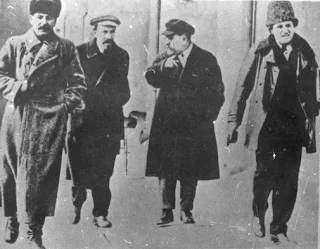THE DISCUSSION ON SELF-DETERMINATION SUMMED UP - Conclusion
From THE DISCUSSION
ON SELF-DETERMINATION SUMMED UP
July 1916
Lenin
11. CONCLUSION
Contrary to the erroneous assertions of the Polish Social-Democrats, the demand for the self- determination of nations has played no less a role in our Party agitation than, for example, the arming of the people, the separation of the church from the state, the election of civil servants by the people and other points the philistines have called “utopian”. On the contrary, the strengthening of the national movements after 1905 naturally prompted more vigorous agitation by our Party, including a number of articles in 1912-13, and the resolution of our Party in 1913 giving a precise “anti- Kautskian” definition (i.e., one that does not tolerate purely verbal “recognition”) of the content of the point.,
It will not do to overlook a fact which was revealed at that early date: opportunists of various nationalities, the Ukrainian Yurkevich, the Bundist Liebman, Semkovsky, the Russian myrmidon of Potresov and Co., all spoke in favour of Rosa Luxemburg’s arguments against self-determination! What for Rosa Luxemburg, the Polish Social-Democrat, had been merely an incorrect theoretical generalisation of the specific conditions of the movement in Poland, became objective opportunist support for Great-Russian imperialism when actually applied to more extensive circumstances, to conditions obtaining in a big state instead of a small one, when applied on an international scale instead of the narrow Polish scale. The history of trends in political thought (as distinct from the views of individuals) has proved the correctness of our programme.
Outspoken social-imperialists, such as Lensch, still rail both against self-determination and the renunciation of annexations. As for the Kautskyites, they hypocritically recognise self- determination—Trotsky and Martov are going the same way here in Russia. Both of them, like Kautsky, say they favour self-determination. What happens in practice? Take Trotsky’s articles “The Nation and the Economy” in Nashe Slovo, and you will find his usual eclecticism: on the one hand. the economy unites nations and, on the other, national oppression devides them. The conclusion? The conclusion is that the prevailing hypocrisy remains unexposed, agitation is dull and does not touch upon what is most important, basic, significant and closely connected with practice—one’s attitude to the nation that is oppressed by “one’s own” nation. Martov and other secretaries abroad simply preferred to forget—a profitable laps of memory!—the struggle of their colleague and fellow-member Semkovsky against self-determination. In the legal press of the Gvozdyovites (Nash Golos66) Martov spoke in favour of self-determination, pointing out the indisputable truth that during the imperialist war it does not yet imply participation, etc., but evading the main thing—he also evades it in the illegal, free press!—which is that even in peace time Russia set a world record for the oppression of nations with an imperialism that is much more crude, medieval, economically backward and militarily bureaucratic. The Russian Social-Democrat who “recognises” the self-determination of nations more or less as it is recognised by Messrs. Plekhanov, Potresov.and Co., that is, without bothering to fight for freedom of secession for nations oppressed by tsarism, is in fact an imperialist and a lackey of tsarism.
No matter what the subjective “good” intentions of Trotsky and Martov may be, their evasiveness objectively supports Russian social-imperialism. The epoch of imperialism has turned all the “great” powers into the oppressors of a number of nations, and the development of imperialism will inevitably lead to a more definite division of trends in this question in international Social- Democracy as well.
V. I. Lenin, Collected Works,
Vol. 22. pp. 358-60





.jpg)






